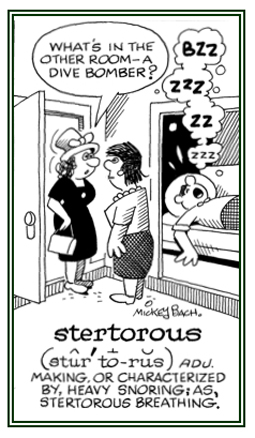English Words in Action, Group S
(a variety of English words which have developed through history and are currently used in our modern age)
Simply click on this banner (or the following link) and you will be on your way to stimulate your brain for greater word comprehension with quizzes based on some of the words in this unit.
Behavior that is secret, quietly inconspicuous, or intended to be unnoticed: The stealth of the cat stalking the mouse was impressive to watch.
stealthily (adverb), more stealthily, most stealthily
In a manner that is intended to be done very quietly in order not to be noticed: The camera crew moved stealthily closer and closer to the pride of lions.
A secret, quiet, and clever way of moving or behaving: Reba and Shawn watched the stealthiness of the crane as it stalked the pond searching for frogs to eat.
stealthy (adjective), stealthier, stealthiest
1. A reference to being quiet and secret in order to avoid being noticed: The stealthy approach of the cat towards the bird on the window sill was sure to surprise the bird.
2. Secretive or dishonest with one's actions: The stealthy politician lost the election as a result of the media leaks about his behavior.
3. Etymology: "theft, action" or "practice of stealing"; from Old English stælþ, which is related to stelen, "steal"; from Proto German stælitho. The sense of "secret action" developed about 1300, but the word also retained its etymological sense into the 18th century.
2. Secretive or dishonest with one's actions: The stealthy politician lost the election as a result of the media leaks about his behavior.
3. Etymology: "theft, action" or "practice of stealing"; from Old English stælþ, which is related to stelen, "steal"; from Proto German stælitho. The sense of "secret action" developed about 1300, but the word also retained its etymological sense into the 18th century.
stertorous (STUR tur uhs) (adjective), more stertorous, most stertorous
1. A heavy snoring sound while breathing during sleep; accompanied by a hoarse snoring or gasping sound: Trying to sleep with a stertorous wife makes it difficult for the husband to continue sleeping and it also applies when the circumstances are reversed.
2. Etymology: from Latin stertere, "to snort".

© ALL rights are reserved.
Go to this Word A Day Revisited Index
2. Etymology: from Latin stertere, "to snort".

Go to this Word A Day Revisited Index
so you can see more of Mickey Bach's cartoons.
stifle (verb), stifles; stifled; stifling
1. To kill by preventing respiration or to suffocate: The smoke from the burning building stifled some of the firefighters.
2. To interrupt or to cut off: Tom stifled his voice when he realized that he was saying something bad to his mother.
3. To hold back or to suppress: Jill was told by her father to stifle her yawning while he was talking to her.
4. To be unable to breathe freely: While he was trying to sleep, Ivan was stifling in the hot hotel room.

© ALL rights are reserved.
Go to this Word A Day Revisited Index
2. To interrupt or to cut off: Tom stifled his voice when he realized that he was saying something bad to his mother.
3. To hold back or to suppress: Jill was told by her father to stifle her yawning while he was talking to her.
4. To be unable to breathe freely: While he was trying to sleep, Ivan was stifling in the hot hotel room.

Go to this Word A Day Revisited Index
so you can see more of Mickey Bach's cartoons.
1. A fixed period of time spent on a task or job: Marissa had to do a two-year stint as an apprentice in her new job.
2. An individual's prescribed share of work: Harriet's stint as a nanny prepared her for motherhood.
3. A limitation or restriction; especially, in time or amount: Josie was told that there was a stint of six months during which she could apply for early retirement.
4. An unbroken period of time during which something is done: Mike's stint as an administrative assistant prepared him for his new position as a senior manager.
5. A pause or stoppage: After a long session of working on the project, the director suggested that the group take a stint and have some refreshments.
6. The smallest American sandpiper or bird with long legs and a long thin beak: James saw several stints on the beach of the sea this summer.
7. Etymology: "to limit, to restrain, or to be sparing or frugal"; from Old English styntan "to blunt, to make dull".
2. An individual's prescribed share of work: Harriet's stint as a nanny prepared her for motherhood.
3. A limitation or restriction; especially, in time or amount: Josie was told that there was a stint of six months during which she could apply for early retirement.
4. An unbroken period of time during which something is done: Mike's stint as an administrative assistant prepared him for his new position as a senior manager.
5. A pause or stoppage: After a long session of working on the project, the director suggested that the group take a stint and have some refreshments.
6. The smallest American sandpiper or bird with long legs and a long thin beak: James saw several stints on the beach of the sea this summer.
7. Etymology: "to limit, to restrain, or to be sparing or frugal"; from Old English styntan "to blunt, to make dull".
stint (verb), stints; stinted; stinting
1. To supply sparingly and with restricted quantities: He tends to be stinting with praise for their good work.
2. To restrict or to limit, as in amount or number: He doesn't stint with his eating.
3. To subsist on a meager allowance: The parents stint on the amount of money they let their children spend.
2. To restrict or to limit, as in amount or number: He doesn't stint with his eating.
3. To subsist on a meager allowance: The parents stint on the amount of money they let their children spend.
1. Someone who is unemotional and seemingly indifferent to pleasure, affliction, or joy: Carol wanted to be a stoic and endure the pain she was having following the operation on her leg.
2. Etymology: from Latin stoicus, from Greek stoikos, "pertaining to a member of or the teachings of the school founded by Zeno, characterized by austere ethical doctrines."

© ALL rights are reserved.

© ALL rights are reserved.

© ALL rights are reserved.
Go to this Word A Day Revisited Index
2. Etymology: from Latin stoicus, from Greek stoikos, "pertaining to a member of or the teachings of the school founded by Zeno, characterized by austere ethical doctrines."
Literally, "pertaining to a portico," from stoa "porch".



Go to this Word A Day Revisited Index
so you can see more of Mickey Bach's cartoons.
stolid (adjective), more stolid, most stolid
1. Referring to a person or a thing that is dull, uninteresting, and not very exciting; expressionless: The man behind the desk in the office was quite stolid and impassive as Susan and Marc explained their sad plight to him.
2. Etymology: from Latin stolidus, "insensible, dull, slow, brutish, rude, stupid."

© ALL rights are reserved.

© ALL rights are reserved.
Go to this Word A Day Revisited Index
2. Etymology: from Latin stolidus, "insensible, dull, slow, brutish, rude, stupid."


Go to this Word A Day Revisited Index
so you can see more of Mickey Bach's cartoons.
stony (adjective), more stony, most stony
1. Regarding something or a place which is abounding in, covered with, or full of stones: Jim and Carla had a very stony beach instead of a sandy one as they had hoped for.
2. Descriptive of a stone, as in hardness: The stony steps were very cool when the couple sat down on them to enjoy the stars in the sky.
3. Characterizing a person who is hardhearted and unfeeling; unemotional: Little Sally didn't like her aunt who had a stony glare when she was having tea with the rest of the family.
4. Concerning an individual who exhibits no feeling or warmth; impassive: Henry had a stony expression when he was told that he could not go on the trip.
5. Pertaining to someone who is in a state of emotional numbness or is petrified: The noise that woke Shirley up at night gave her a stony feeling of fear.
6. Etymology: from Old English stanig, "stony, rocky".

© ALL rights are reserved.
Go to this Word A Day Revisited Index
2. Descriptive of a stone, as in hardness: The stony steps were very cool when the couple sat down on them to enjoy the stars in the sky.
3. Characterizing a person who is hardhearted and unfeeling; unemotional: Little Sally didn't like her aunt who had a stony glare when she was having tea with the rest of the family.
4. Concerning an individual who exhibits no feeling or warmth; impassive: Henry had a stony expression when he was told that he could not go on the trip.
5. Pertaining to someone who is in a state of emotional numbness or is petrified: The noise that woke Shirley up at night gave her a stony feeling of fear.
6. Etymology: from Old English stanig, "stony, rocky".

Go to this Word A Day Revisited Index
so you can see more of Mickey Bach's cartoons.
1. An individual who only assists another one; especially, in accomplishing unpleasant and disagreeable work: In the melodrama that Sally was watching, Joey was the stooge to do the troublesome job of stealing some horses for the escape of Sam, his boss, and his beautiful maiden.
2. An actor whose performance requires being the victim or target of a comedian's jests and mockery: The entertainer used Tim as a stooge to be the laughing stock when he played his pranks and tricks on him for the audience to laugh at during the presentation at the circus.
4. Etymology: unknown.

© ALL rights are reserved.
Go to this Word A Day Revisited Index
2. An actor whose performance requires being the victim or target of a comedian's jests and mockery: The entertainer used Tim as a stooge to be the laughing stock when he played his pranks and tricks on him for the audience to laugh at during the presentation at the circus.
4. Etymology: unknown.

Go to this Word A Day Revisited Index
so you can see more of Mickey Bach's cartoons.
1. A strong disturbance in the air above the earth, with strong winds and usually also with rain, snow, sleet, or hail and sometimes lightning and thunder: Aimee and Roger were outside when the storm hit, so they had to run for cover.
2. A sudden occasion of something in large amounts: The politician was welcomed with a storm of applause.
2. A sudden occasion of something in large amounts: The politician was welcomed with a storm of applause.
storm (verb), storms; stormed; storming
1. To attack violently or to attack or to capture a place; especially, a well-defended one, suddenly and with great force: The soldiers stormed the barricades.
2. To be violently and noisily angry, or to say something in this way: The mob stormed through the streets as they expressed their desire to overthrow the government.
3. To go somewhere in a rush, violently or angrily: Trisha stormed out of the room as she yelled at her husband.
2. To be violently and noisily angry, or to say something in this way: The mob stormed through the streets as they expressed their desire to overthrow the government.
3. To go somewhere in a rush, violently or angrily: Trisha stormed out of the room as she yelled at her husband.
"Do you know who I am?", Trina stormed.
4. To blow strongly, and to drop large amounts of dust, rain, snow, sleet, etc.; or to do more than one at the same time or closely together: It stormed all night and suddenly without any warning.
1. Materials, equipment, supplies, components: Janet has the stuff that she needs to make the rug.
3. Something that doesn't have a specific name: The stuff that Elva says about Norbert is simply not true.
Someone has said that hope is the stuff that dreams are made of.
2. Things, belongings; possessions or a pile of things: Michael left his stuff in his Mother's attic when he moved to his new job in another state.3. Something that doesn't have a specific name: The stuff that Elva says about Norbert is simply not true.
Links to all of the groups of English words in action, Groups A to Z.
You may see the bibliographic list of sources of information for these words in action.


